Daniel Johnson served on the board of Chicago Cabaret Professionals, and he led the effort to launch Chicago Cabaret Magazine Sept 1, 2020. His dedication to the art form of cabaret is real, thoughtful, and well researched. He recently stepped out of his roles as Editor and Board Member, and this is my interview with him in November 2023.
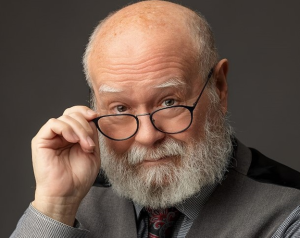 ANNE: Hi, Daniel.
ANNE: Hi, Daniel.
DANIEL: Hi, Anne.
ANNE: I wanted to tell you from my heart that I truly love the magazine — and to take it from a newsletter for our members to an online magazine that is available to the public is fantastic. Your leadership on this was incredible and I feel that it needs to be celebrated because it is great thing for our organization, for all of cabaret, and actually the history of cabaret.
DANIEL: Thank you! I’m very proud of what we did with the magazine, and it was a collaboration. When we started off, we were doing not a hard copy, but we were trying to put it on a website, and it was quite a process to get the tech lined up, but we ended up finding a way to do it.
ANNE: The original newsletter started in 2008.
DANIEL: Yes. I think I had a slightly different vision for the content than the previous editors, but the newsletter was going along just fine before I took it up. When Hilary Feldman was the editor, it was a member-only newsletter. She did a great job with the content, but it was an entirely different approach. And then Charles Troy took it over as editor and he had a different vision for it as well. He was a graphic artist and so it became very graphical, which was terrific. But then there were a couple periods of time that went by where there should have been an issue and there wasn’t an issue. And, although I have never had a formal journalistic background, I’ve had journalistic inclinations since high school, when I co-edited the high school newspaper with a friend. It was really, primarily, a humor magazine. We were trying to send up our teachers and what was going on at the school and so on. And I even wrote a feature article about my family pet, my dog at home, and had it on the front page.
ANNE: Where did you grow up?
DANIEL: I’m from southwestern Michigan, but clear down by the border; my parents had a business in Elkhart, Indiana. They were in the mobile home industry, but my dad was a sportsman and he loved hunting and fishing and so on, so he decided to reside in Michigan. We were just across the border for our residence, but I think of Elkhart, Indiana, as my hometown. High school was an interesting experience for me. I went to grade school in Elkhart, I had a sort of Hoosier mentality through grade school. But then, the Michigan schools were really different, and I had a really good high school experience. The music department was terrific. I was in band. I played clarinet and then I also sang in choir.
ANNE: Did you learn to read music in the music department there?
DANIEL: Yeah, I had already started learning how to read music for playing the clarinet. Those Michigan teachers, they had standards, and I had a good high school education preparing to go to college. Then, after graduating from high school, I was a summer camp counselor and did the camp newsletter. But my writing was honed while in college at Western Michigan University.
ANNE: That’s my hometown, I’m from Kalamazoo.
DANIEL: Well, I love Kalamazoo. I had a brilliant four years there and it was very influential. I got my BA (class of ’69) with a dual major: Speech and English. The speech major came first and then I really wanted to also get an English major, for other interests, the literature primarily. I did a lot of writing, some creative writing, but a lot of scholarly writing. And I was also bitten by Shakespeare and loved my Shakespeare classes.
ANNE: I was going to ask; did that lead you into theater?
DANIEL: I didn’t know that the theater was going to be my thing when I started off. But I had an experience while I was there that was very influential as far as my theater career is concerned. I had a term abroad in my junior year. We had a program that was literature study, and it was based at the University of Wales in South Wales. I think it was about a six-week program where we had wonderful lecturers, and we read a lot of material, and had seminars. Then there was a month free where we were supposed to write a paper while we resided in London. I lived in a hostel in London for a month and I saw 30 plays in 30 days.
ANNE: Oh my goodness, it’s got to be a record.
DANIEL: Absolutely. And I wrote, wrote, wrote, wrote about that experience. And it was really very, very educational. And the thing that impressed me the most of all in seeing plays, was not the commercial theater, it was the institutional theater, public theater, and repertory theater. And you know, back in those days, it was basically the Shakespeare Theater and the National Theater, also the Old Vic. I got to see how repertory theater works. Of course, I was aware that there were repertory theaters here, but regional theater was very young back in the sixties, regional repertory theater was just starting. I knew about the Guthrie, and about what was happening here in Chicago. There was a regional theater in Texas, the Alley Theater in Dallas.
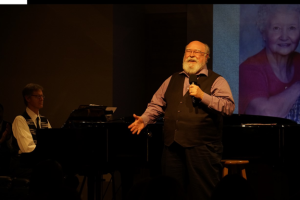
Mother’s Day Concert with Song Shop Live
ANNE: Did that experience introduce you to Welsh writers?
DANIEL: No, not so much, but that we had a chance to interact with really professional scholars. For instance, because of my Shakespeare interest, I had a seminar with Glynn Wickham who wrote the book, Early English Stages. He was the world authority on early Shakespeare – how Shakespeare was staged in its own period. And that was fabulous. One of the other authors that I was particularly impressed with was George Orwell. We had a professor that led a seminar on Orwell.
ANNE: What a great introduction to literature and theater.
DANIEL: Yes, and I decided to go to graduate school, thinking that I was going to become a director in educational theater, and I got a grant to study at the University of Oregon in Eugene, Oregon. And so, on my way to Eugene, Oregon, I stopped in Ashland, Oregon, where there is one of the oldest Shakespeare theaters in the United States, the Oregon Shakespeare Festival, and saw a couple plays in their repertoire.
ANNE: Wow, from England to Oregon. And you’re in graduate school?
DANIEL: I was, but, oh, my gosh. I didn’t get my doctorate. After my first year of studies towards my doctorate, I was hired as an actor at the Oregon Shakespearean Festival! So, I actually had the experience of being a repertory theater actor and, oh my, it’s like you’re studying it, falling in love with it, and then doing it. At that point, I had really decided that I wanted to try becoming a professional actor.
Now, this was in the early seventies and trying to make a living as an artist in our culture is a challenge to say the least, with no governmental support. Nothing. So, when I decided that I wanted to become an actor, I quickly wound up my graduate studies and got a master’s degree, specialized in teaching acting. And then, I decided that I would try to get some more training as an actor, and that led me to San Francisco.
ANNE: San Francisco!
DANIEL: I was admitted into the advanced training program at ACT, the American Conservatory Theater. I was there for one year and they kicked me out.
ANNE: Kicked you out?
DANIEL: Well, the program was designed so that second-year students would participate on stage as extras in the main stage productions at ACT. I had already done all that and they said I didn’t need to learn how to carry a spear or dress the stage, they sent me out to work. I was a San Francisco-based aspiring actor until 1979.
ANNE: Were there any musicals involved in the season because I know most repertory seasons have several musicals?
DANIEL: Not at ACT but I did a wonderful production of She Loves Me (Sepos) and then Boy Meets Boy was life changing.
I was cast as the comic lead in a musical called Boy Meets Boy written by Bill Solly. It was gay musical that was from Off Broadway in New York. It was an original and brilliant piece of musical theater, and I was cast as the comic lead — the villain of the piece — and I had really great numbers and they invited me to play my part in Los Angeles in the LA company. That’s what took me to LA. And then when Boy meets Boy closed, the producer of that show kept the theater that she had rented for that production and turned it into something called the Lyric Repertory Theater. And I did my first Gilbert and Sullivan with her there. That was G&S Patience, and I sang a lovely lyrical tenor part. It was really very foundational to do Gilbert and Sullivan. And then I did a children’s show with them, an original where the composers wrote the material for us as performers, which was a lovely, a great experience. I also had an A.E.A (Equity) apprenticeship at a regional theater in Los Gatos, California — the California Actors Theater. I had a wonderful year. It was just fabulous. A full season in a regional repertory company. So, I did as much theater as I could do on the west coast in the time I was there.
ANNE: OK. So, take me from California, because I thought you were from New York?
DANIEL: Well, I felt like I had sort of given California and the west coast a good try and decided I would move to New York. And I spent all of the eighties and most of the nineties based in New York City. I was really striving to become a character actor in a rep company, specializing in playing older characters too. And, I did have a period where I was cast and worked in regional theater. I did three seasons at the Virginia Museum Theater primarily because they cast me in A Christmas Carol as Mr. Fezziwig. I did the Fezziwig Dance Party, three seasons running.
ANNE: I think of the friendships too that you develop.
DANIEL: Oh, yeah, most of the people that I worked with in New York had West Coast connections because you work with the people that you know, and people knew me from the West Coast. I had a relationship with the Riverside Shakespeare company in New York who knew me from Berkely. The first thing that I did for them was Friar Lawrence in Romeo and Juliet, which was an Off-Broadway contract. And that was my debut in New York, Friar Lawrence. And then I worked with them through the years, and I was an associate director. Towards the end, I directed a number of staged readings and a couple of shows that were main stage shows for Riverside. So that was my home company.
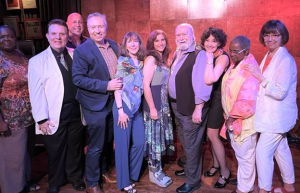
With entertainers for Circle of Song 2022
ANNE: And you found your way.
DANIEL Yes, I did. And, I also taught acting and Shakespeare verse coaching — the First Folio technique. You might be familiar with the First Folio Theater here in Chicago. The technique came out of the Royal Shakespeare Company. It was somewhat easy for me to teach because I had such a strong speech background, and I concentrated quite a bit on oral interpretation and the oral interpretation of poetry involves a lot of analysis. A lot of brilliant writers write what I call actor-proof material. If you can understand what the playwright is trying to do verbally, it supports your work as an actor. And Shakespeare was very tuned into that — he wrote for his own company. And he was trying to write actor-proof material. And he was very good at it. Much of the clues that are in the text are based on an understanding of rhetoric and poetic devices. And just recognizing that they’re there and not ignoring them, you know, letting them feed your work as an actor.
ANNE: It’s called First Folio technique?
DANIEL: It is. So, we don’t think that Shakespeare’s actors rehearsed, they learned their parts through repetition, but their first encounter with their material was as “sides.” All they had was a cue line and their own parts. The clues that are in the rhetoric of their lines were very important clues in terms of what that character wanted and what they were doing.
We worked with scrolls with just our own lines from the original text! With all that archaic typography and everything. It’s kind of hard to get used to doing that, but we performed the plays in the fashion of Reader’s Theatre without rehearsing just from being familiar with our own lines. And it worked! I mean, it worked at the Royal Shakespeare Company. I worked with Patrick Tucker who learned it at the RSC, and we tried it and it worked for us.
ANNE: Oh my God, you would still memorize your own part.
DANIEL: Yes. It was a wonderful experience and a lot of actors loved working that way, but it’s sort of a trick to show you can do that. But we’re modern actors.
ANNE: Still, it’s a good exercise.
DANIEL: And it’s very tuned into the text and that relates to cabaret in respect to paying special attention to the lyrics. By the way, my current project is something called Lyrics by Shakespeare. I’ve been turning my interest back towards where I came from, as a Shakespearean actor, and I had this idea for a show to work with Shakespeare’s songs and put it into some kind of a context. I’ve had that idea for a long time.
ANNE: Yeah, that has legs, you know.
DANIEL: Well, I think it has interest. Everybody loves Shakespeare!
ANNE: So, let’s find out why you got into cabaret. How did you do that?
DANIEL: Well, oral interpretation usually involved using material from literature and turning it into performance art and I had done a fair amount of that. I had adapted novels and poetry and plays into programs.
ANNE: They were not with music?
DANIEL: No, just page to the stage. That was something that I had learned how to do as an undergraduate.
ANNE: So, you’re a kind of screenwriter as well?
DANIEL: Well, more of an adaptor. It’s adapting pre-existing material to tell a story. I did several of those. Then I came back to Michigan: this involves a little personal diversion. At the end of the nineties, my mom was diagnosed with lung cancer, and she lost one of her two lungs and I’m an only child. So, my career was not flourishing, particularly in New York at the time, and I was basically called to move back to Michigan and take care of my mother and that went on for a number of years. It was challenging for David (Stephens). We had just become a couple; we had just decided to make a home together. He was so understanding, but he knew that if he were in my situation that he would do the same thing. So, we had a long-distance relationship while I lived in Michigan for a number of years visiting each other and vacationing together. I didn’t miss acting particularly, but what I found I really missed was — singing. Towards the end of taking care of my mom, I started acting again locally in civic theater. And one of the roles that I was cast in was Chris Kringle in Miracle on 34th Street.
ANNE: Well, that’s perfect for you.
DANIEL: Well, it was, I always wanted to play him, he’s everything Christmas. Santa Claus is a very interesting character, but he’s a myth, he’s not a real person, but in the play, Chris Kringle is a real person. I had to figure out my biography for Chris Kringle, which was very lengthy and involved vaudeville. I decided that this Chris Kringle was not only an expert on toys because that was his business; a toy seller, manufacturer and so on. He also was an expert on all things Christmas and loved to tell stories about Santa Claus and then took it on the vaudeville stage. So, (in my version) he was a performer.
ANNE: I love that, like just kind of creating that back story.
DANIEL: Yeah. And so that’s how I approached it. After that experience, I realized, if Chris Kringle can put on a Santa Show, why can’t Dan Johnson put on a Santa show, which I proceeded to do.
ANNE: I want to hold that thought because I want to come back to the whole relationship with Saint Nick. But I want to ask about David and how you met in New York.
DANIEL: We met at a Pride Festival. The day before the Pride Parade, I had a date to meet a friend in Union Square Park. I went to Union Square, and David was sitting at the table with my friends. He was working the table for some organization that was associated with Pride. So that’s how we met. And, hello? Hello. Hello. Who are you? And so, after that, we had a couple of dates and then David was involved in leading an organization called URSUS Major (BIG bears), which was an offshoot of Girth and Mirth, which is all about big guys in the gay culture. It’s usually chasers pursuing big gay guys. However, there was a small group of us that were also attracted to big guys, so big guys who were attracted to big guys. David’s organization was founded for those people. Ursus Major was a social outlet for me. I joined David’s organization, and we developed our relationship there for a year, before mom got sick. You know David was a retired magician and clown. He was really very active in the magic community. People from his high school experience remember him primarily as a magician, which was a very odd choice as a young black man. Talk about the fringe!
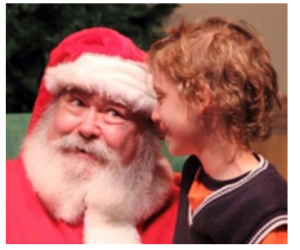
Santa listening to a wish
ANNE: Now, I want to come back to talking about your left turn into doing Santa. I know that you developed that show and there’s all kinds of wonderful material. It’s not just the traditional Christmas music but filled with songs I didn’t know at all.
DANIEL: Well, to go back before all that, in high school, our band did something called band Follies. These were variety shows and Follies could be whatever we wanted them to be. When I was a junior, we decided that we would do a selective version of The Music Man. We were head over heels with The Music Man. We thought that Meredith Willson was writing about our hometown. It really spoke to us. In our senior year, we were amazed to discover that Meredith Willson had written a new musical called Here’s Love (a musical version of Miracle on 34th Street) and that it was playing in Detroit at the Fisher Theater on its way to Broadway! Our band took a bus trip to Detroit to see Here’s Love in the pre-Broadway run, and it was very interesting. It was not terribly successful (on Broadway). It ran for one whole season, and I think maybe made it to Christmas the second year and then closed. Anyways, Meredith Willson is a hell of a songwriter and there’s some really delicious material from that show, which I used. I had three songs I did lyrics for and worked with a songwriter friend, Paul Johnson, in NYC to set them to original music. The other one was a parody. I also was very taken by what Macy’s was doing during my writing of that show, with their Believe campaign. Yes, Virginia, (There is a Santa Claus) debuted in the Macy’s Parade. Yes, Virginia was kind of my 11 o’clock number in my Santa show.
ANNE: Well, you’re certainly overqualified to be in cabaret! I’m kidding. But in addition to performing cabaret you began putting out the magazine for Chicago Cabaret. We couldn’t have done it in the fashion that you did it — with these features such as In the Spotlight and Center Stage plus historical articles
DANIEL Basically it’s just journalism that tries to serve the mission of our organization and the mission is very important. Because cabaret is an art form that is somewhat unique. It’s a theater-based phenomenon but it’s not theater, it’s variety. See, one of the things that our mission serves best is defining cabaret. It’s not a concert, it’s a show and as a show it doesn’t have a book, it doesn’t have a plot. It might have a theme. It’s an act, it borrows a lot from theater like the Musical Revue. Well, that’s magical to me, that is just magical.
I’ve been following some of the New York artists that have been performing here. Jeff Harnar is just astounding. I recently saw his Cy Coleman show, “A Collective Cy” and he told a lot of showbiz stories when he did that show and it was wonderful ‘state of the art’ cabaret. Of course, the singing was outstanding. His Sondheim show, which we saw about a year ago, was astounding. He had one line of patter. And the songs kind of went right into the next one and his patter for that was, “This is not Sondheim’s story, this is my story.” That’s all he said. And then you knew that the songs were about him, not about the writing of the songs or what musical they’re from or what was happening in Sondheim’s life or whatever, it was about him. That was the concept.
ANNE: That’s almost the definition of the cabaret, right? And he did it so brilliantly. I love that.
DANIEL: I have a lot of difficulty when I hear advocates say that you can’t have too much talk in a cabaret show. As a writer, I don’t agree with that. I think that variety arts can include telling stories even monologue and sketches.
ANNE: You’ve just shown two examples here. There was one where Jeff gave a lot of stories and one where he said one line. They’re both cabaret.
DANIEL: Exactly. Yeah, they’re both brilliant cabaret. The other thing that I wanted to point out about variety arts is — it’s a ticklish subject — but there are important points to be made about AGVA (American Guild of Variety Artists), the union for a variety artists. The variety arts that they cover include music, dance revues, cabaret, circus arts, magic, et cetera.
ANNE: Burlesque.
DANIEL: Well, they don’t mention burlesque but yes, if the act is dancing and, well, that’s an interesting story. Not so long ago there was a strip show in Los Angeles where the ladies decided that they were being misused by the management and they needed representation, so they turned to Actors Equity. And AEA let them join and took charge of that. I think it’s because AGVA is so inactive in LA. Now, if you wanted to have union representation as a cabaret artist here, you could do it under Equity, you can do it under the musicians union. So, you can get union representation here. It’s not because AGVA doesn’t exist in Chicago that prevents a cabaret artist from having union representation it is a choice.
But AGVA is important from the definitional standpoint, those things that I mentioned were all Variety. And the distinction is it has everything to do with playwriting. Variety, the publication, which is as old as the hills, basically wrote about two different aspects of show business. They wrote about Variety, which was at that time, Vaudeville basically, and Legit which covered plays and musicals with books. A Variety show has skits, monologues, comedians, etc. That is why I think it’s good to remember that cabaret is a Variety Art.
Another thing that you questioned me about that I’m very hot on is what’s happening in contemporary musical theater.
ANNE: Yes, I just got that article from you, and you alerted me to a very hip director and critic, SCOTT MILLER. https://www.newlinetheatre.com/AT-july-2014.pdf
DANIEL: He was a critic first and then a director in Saint Louis named Scott Miller.
ANNE: How did you discover him?
DANIEL: When I was taking care of mom, I saw his first book online called Deconstructing Harold Hill and being a Music Man freak, I had to have that book. He wrote other essays about other musicals that are in the golden age, but his point eventually is that the golden age pretty much coincides with the Great American Songbook for us, and we may be in the midst of a new golden age. The stuff that’s happening in contemporary musical theater right now is really very exciting and has to feed us as cabaret artists the way theater has always fed us. For instance, the last season on Broadway, the Jason Robert Brown musical Parade made quite an impression. And this year, the Goodman Theater is going to be doing his new musical in Chicago, Midnight In The Garden of Good and Evil. I love his work and he’s only one of many people that are really doing quite astounding contemporary theater. As the editor, I’ve been talking to people almost ever since I started, to try to find people that are young and into contemporary theater so that they could perhaps write about it.
ANNE: Yes, just think of how Lin Manuel Miranda has turned non-musical theater people into rabid fans, and they never probably went to a musical in their lives before Hamilton.
DANIEL: Exactly, because it speaks right from the center of our culture.
ANNE: Even though it’s an old subject, it doesn’t matter.
DANIEL: No, not at all. It’s storytelling that’s pertinent because of the way it’s been told.
I thought that this was an important thing to include because I hadn’t accomplished that. I wrote one article about my own awakening towards contemporary musical theater, but I really wanted more of that in the magazine. I hope somebody picks up on that.
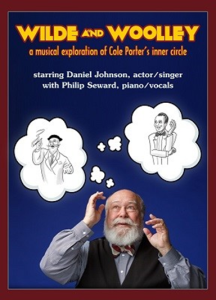
Poster for “Wilde and Woolley”
ANNE: I guess it’s going to be up to us to recruit some writers! And our new Vice President Ellen Winters Reynolds is going to be editing the magazine, along with our tech team, Boyle Wong, Painted Bamboo. We do need to keep moving forward, as well as looking at our history, which I think you’ve done an incredible job of doing – keeping us current and looking back at our history, like the 100 years project that you covered on the southside of Chicago.
DANIEL: Chicago has an important place in the history of cabaret, but it’s all linked up with the history of jazz, the dance craze and so on; it’s a very big subject. But from the theater historian standpoint, it’s really important because people were calling it “cabaret” back then. Our singers and cabaret artists these days are more comfortable with “nightclub,” but “nightclub” is a synonym for cabaret. And they used to use the term cabaret at the time in the nineteen teens and twenties.
ANNE: I wanted to talk a bit about your role with Chicago Cabaret Professionals, and how that started.
DANIEL: I was in Development, and then I had done some committee work for the group before and some work for Venues.
ANNE: Ah, so you volunteered in many of our committees, and they scooped you up to be on the board. I found your guidance helpful throughout the most challenging parts of moving the website from all those piecemeal services to a bigger platform. You were really responsible in pulling all the archived materials that we had, all those print newsletters going back to 2008, and converting them. And the new online magazine makes it so every single article can be shared on all those social media plans. And a lot of people see it. They kept getting a hold of us and saying, where can I get this article? When people are mentioned in there, we try to tag them so that they can share the articles and we can stick with our mission, you know, keep spreading the word of the art of cabaret and keep defining it. But I want to know what is the next chapter for you, Daniel.
DANIEL: David just recently retired and, I’ve been retired for years. When I turned 76 I realized that is a lot of trombones!
ANNE: But we’ve had you working, just about full time.
DANIEL: Well, it was, and that’s the reason I had to step away. It was just too much work and there is a fair amount of grunt work involved in it when you’re publishing. You know, it’s like you don’t just have an idea and suddenly it gets published. There’s a process, a lot of it is really hard work and I was not willing to do it anymore. I had too much, it was taking too much energy out of my life. I wanted to get back to my life and that’s going well.
ANNE: What is the next plan for you like?
DANIEL: Shakespeare, that’s the next project that I have that has been on my radar for a long time that I feel has potential. But it’s been on the back burner and right now I’m doing research, everything’s a moving target. If, when you’re involved in tech, you really know that because you can become a tech expert. And then a year later you have to go back to school because of the tech.
ANNE: Not even a year.
DANIEL: No, no, not even a year. Well, anyways, Shakespeare research has moved with similar speed. So even though I consider myself to be fairly well informed about Shakespeare’s life and times, the research that has come down the pike since I gained my expertise is astounding.
ANNE: He wrote songs?
DANIEL: Yes, he wrote lyrics to songs, and composers set his lyrics to music. Or lyrics were written to popular tunes of the day.
ANNE: This is a great project – we are going to be excited to interview you about next time.
DANIEL: Thank you.
ANNE: Well, Daniel, thank you for being with me. Is there anything else you would like people to know about you, that you could be contacted if anyone needs a director?
DANIEL: Of course. My contact info is on our webpage.
Also, I’d like people to understand that the group shows which Chicago Cabaret Professional puts on are essentially revues. And there’s one model for revue that we have mined to a fare-thee-well and that is the Artist Cavalcade. That’s what our Galas are, Artist Cavalcades, and that’s usually pretty appreciated. Howard Reich, the music critic for the Tribune, loved those Cavalcades and wrote about them glowingly in the Chicago press. But you know it’s only one way of doing a revue. The problem is doing a revue with more variety than a Cavalcade of singers requires a lot more work.
ANNE: Yeah, right. And budget. Exactly.
DANIEL: I think certainly challenges are before us and there’s all kinds of ways to grow and I still enjoy the art form very much. I’m seeing more theater now than I was able to see when I was the super fan of cabaret, but I’m still seeing lots of cabaret and look forward to writing about it again. Just not on deadline!
ANNE: Yes. Well, thank you, Daniel for everything.
DANIEL: You’re welcome.
-by Anne Burnell
Sidebar:
Daniel Johnson’s most recent article for Chicago Magazine was BECKIE MENZIE HAS THE “TOUCH” WITH SOLO ANNIVERSARY SHOW.





